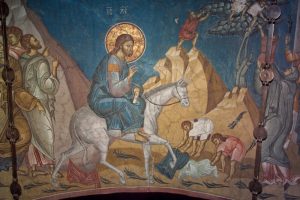 This event has more than historical significance; it also has a spiritual meaning, and therefore also a moral meaning for every modern-day Christian. According to the spiritual meaning, Jerusalem signifies the human soul, and the entry of the Lord into Jerusalem signifies the entrance of God into the soul.
This event has more than historical significance; it also has a spiritual meaning, and therefore also a moral meaning for every modern-day Christian. According to the spiritual meaning, Jerusalem signifies the human soul, and the entry of the Lord into Jerusalem signifies the entrance of God into the soul.
The multitudes of people, crowded and pushing one against another, joyfully awaiting and greeting Christ, symbolize the noble sentiments and exalted thoughts of a person who joyfully greets God, his Savior and Deliverer. The leaders of the crowd of people, who hate Christ and want to kill Him, personify the lower desires and earthbound thoughts, which take the upper hand over man’s noble nature and oppress it. Now this lower human nature rebels against God’s entry into the soul, for when God is enthroned there, the lower nature will inevitably be destroyed.
The Temple in Jerusalem symbolizes the holy of holies of the human soul—that sacred place where the Holy Spirit has if only a miniscule haven even in the greatest sinner. But earthly passions penetrate there also, and lower human nature has used even it to achieve its base aims.
Christ heals the soul of those sick ones who fall down before Him with faith, and this means that certain impulses of the soul, although sick, thirst for unity with God and seek for Him, the only true Doctor in the world. Christ’s prophecy of Jerusalem’s destruction symbolizes the destruction of any soul that God rejects, lays low, and spews forth from Himself.
No one in this world is happy unless he has opened wide the gates of his spiritual Jerusalem—his soul—and received God into himself. A godless man feels lonely to despair. The society of others does not make his loneliness go away, but only increases it. However he who has taken God into his soul will never feel lonely even in a desert. No one dies an eternal death other than one in whom God has died.
St. Nikolai Velimirovich, excerpt from a Homily on the Entry of the Lord into Jerusalem (Palm Sunday)
